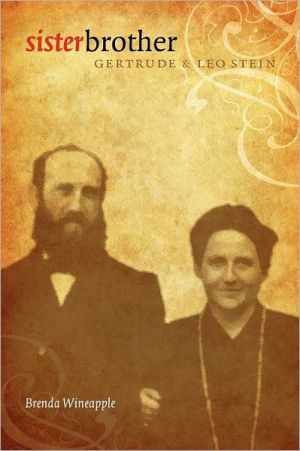

 |

|

The average rating for Sister Brother: Gertrude and Leo Stein based on 2 reviews is 4 stars.
Review # 1 was written on 2012-01-05 00:00:00 Charles Cheraso Charles CherasoI'm really pretty torn about this book: I find the level of research that Wineapple conducts and weaves into her biography to be, frankly, astonishing. I mean, I don't ever doubt the rightness of her facts, but just knowing what kind of colors are on the trees in different parts of Japan or Italy kind of blow my mind. And I think Wineapple is also really good at making connections between what's happening in G Stein's life in terms of its impact on Stein's writing. I for one would never have thought to read Making of Americans as the story that Wineapple describes, but her reading isn't only provocative-- it's persuasive. But on the other side of the tally, I think that this book leaves a lot to be desired. I feel like Wineapple, for all her strength on intellectual currents, is pretty weak on emotional stuff; so, for example, you think there'd be something about G Stein's lesbianism, but no, not really. I mean, there are the women she has relationships with, but very little-- aside from some thoughts about the early death of G and L's mom-- to explore how Stein understood her own sexuality, though I think it's a major part of who Stein is. I mean, not the whole story by any means, but definitely important. Leo, perhaps, fares even worse-- he has an eating disorder, and briefly, a shoe fetish, but neither of these seem to really figure into the larger picture of the man; instead, Wineapple's arc for Leo is in contrast to Gertrude, which is interesting but feels incomplete. In the end, this was, then, a really weird biography. I feel like I know a lot about the minutiae o the Stein's lives and have a better sense of what Stein's writing conceals, but I don't think I ever got a sense of who these remarkable people are or what makes them tick. |
Review # 2 was written on 2012-06-14 00:00:00 Glynis Sakowicz Glynis SakowiczIf you listen to youself talking you will notice that you don't know the words except as you hear them, you can't anticipate your ideas for you can know them only when you find them. The thread on which they are strung is not experience. In fact there may be no such thread.... "My formula is that we find things, our emotions[,] will[,] attitudes and all the rest, and that the simplest way of stating the matter is to say things happen." That consciousness was singular and unified was largely a fiction. If we think that our thoughts are in our heads, he observed, that's because our eyes are in our heads. Looking sharply and thinking deeply were intimately, integrally related. And of course ideas exist in space, he continued. The world is spatial, our relation to it is spatial, even conciousness is the sum of spatial relations, not a thing alone or apart. What we think is basically a function of what we see when we stand where we stand. Profoundly influenced by William James, Leo was struggling toward an antimetaphysical, pragmatic definition of consciousness, one that would ultimately explain aesthetic perception without divorcing perceiver from objects perceived -- which is what he believed cubism had done. He rejected the notion of an isolated consciousness, omnipotent and willful, and was trying to topple the artist from what he viewed as an unwarranted elevation. Bu his timing couldn't have been worse. He was formulating his ideas -- indeed, had to formulate them -- precisely at the moment Gertrude insisted -- indeed, needed to insist -- that the artist was just that inspired being answerable to no one. |
CAN'T FIND WHAT YOU'RE LOOKING FOR? CLICK HERE!!!